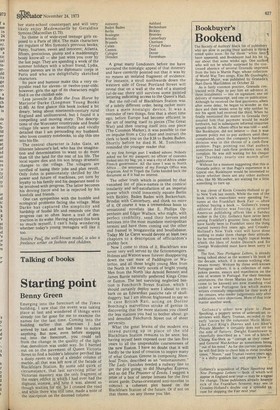Talking of books
Starting point
Benny Green
Emerging into the forecourt of the Times building, I saw that the event was taking place at last and wondered if things were already too far gone for me to examine the names for the last time. Coming into the building earlier that afternoon I had arrived by taxi and not had time to notice anything. But now, even before stepping out into the forecourt, you could tell from the change in the quality of the light that demolition was under way. So I hurried out on to the pavement of Queen Victoria Street tp find a builder's labourer perched like a dusty raven on top of a slender column of marble, all that was left now of the facade of Blackfriars Station. By some odd quirk of circumstance, that last surviving pillar of Victorian masonry was the only fragment of the entkre edifice in, which I had ever had the slightest; interest, ,atiO,h_ere it was, almost as though 'waiting for rner.So I crossed the road and while there Was still time, made a note of the inscription on the doomed column:
Antwerp Ashford Baden Baden Beckenham Berlin Bickley Boulogne Bromley Brindisi Chatham Canterbury Calais Crystal Palace Cannes Deal Cplogne Dover Dresden Faversham brussels A great many Londoners before me have savoured the nostalgic appeal of that itinerary and have correctly pointed out that it was by no means an isolated fragment of evidence. For instance, a stroll northwards down the western side of Great Portland Street will reveal that on a wall at the end of a stunted cul-de-sac there still survives some painted lettering indicating access to the Queen's Hall.
But the roll-call of Blackfriars Station was of a subtly different order, being rather more than a mere nostalgic device. It was a reminder of two things, first that a short time ago, before Europe had become efficient in the art of tearing itself to pieces (The Great War) and then tearing itself into one piece (The Common Market), it was possible to rise on impulse from a City chair and instruct the clerk to book you on the 9.38 to Baden Baden. Shortly before he died H. M. Tomlinson reminded the younger reader that
At my first foreign port I walked ashore. Nobody asked me for my passport; no officer of customs looked into my bag; yet it was a city of Africa under French governance. All the time I was in North Africa , .. the assurance of my Foreign Office was forgotten. And in Tripoli the Turks handed back the document as if it had no interest.
The other truth which is pointed by that vanished list of place-names is the comical insularity and self-satisfaction of an imperial power which could innocently equate Berlin with Bickley, Baden Baden with Beckenham, Brindisi with Canterbury, and think no more of it. Of course it was a tremendous boon to sensational novelists like E. Phillips Oppenheim and Edgar Wallace, who might, with perfect credibility, send their heroes and heroines into the. most mundane metropolitan termini and have them coming out the other end framed in bougainvilia and bouillabasse. Today Mr Le Carre would devote at least two chapters to a description of officialdom's grubby face.
Now I come to think of it, Blackfriars was never very well served by the fictionmongers. Holmes and Watson were forever disappearing down the vast maw of Paddington or Waterloo, and all those bright young Men from the North in the early novels of bright young Men from the North like Arnold Bennett and James Barrie naturally preferred Kings Cross or Euston. The last surviving neglected bastion is Fenchurch Street Station, which I should certainly deploy were I about to embark on an Edwardian pastiche tale of skullduggery, but I am almost frightened to say so in case British Rail, acting on Doctor Beeching's marvellous stroke of genius in discovering that the more stations you closed the less stations you had to bother about, go and demolish Fenchurch Street out of sheer perversity.
What the great brains of the modern era intend putting up in place of the old Blackfriars Station remains to be seen, but having myself been exposed over the last five years to all the unspeakable coarsenesses of the new Euston. I have no doubt that it will hardly be the kind of creation to inspire many of what Graham Greene in composing Stamboul Train, described as an "entertainment." The Lady Vanishes needed a railway line to get the plot going; so did Shanghai Express, and so did The Prisoner of Zenda. I suggest a prize of a box of unripe lemons for the first
' avant garde. Duras-orientated anti-novelist to concoct a coherent plot based on the Blackfriars Station of the future. Or if not on that theme, on any theme you like.


































 Previous page
Previous page